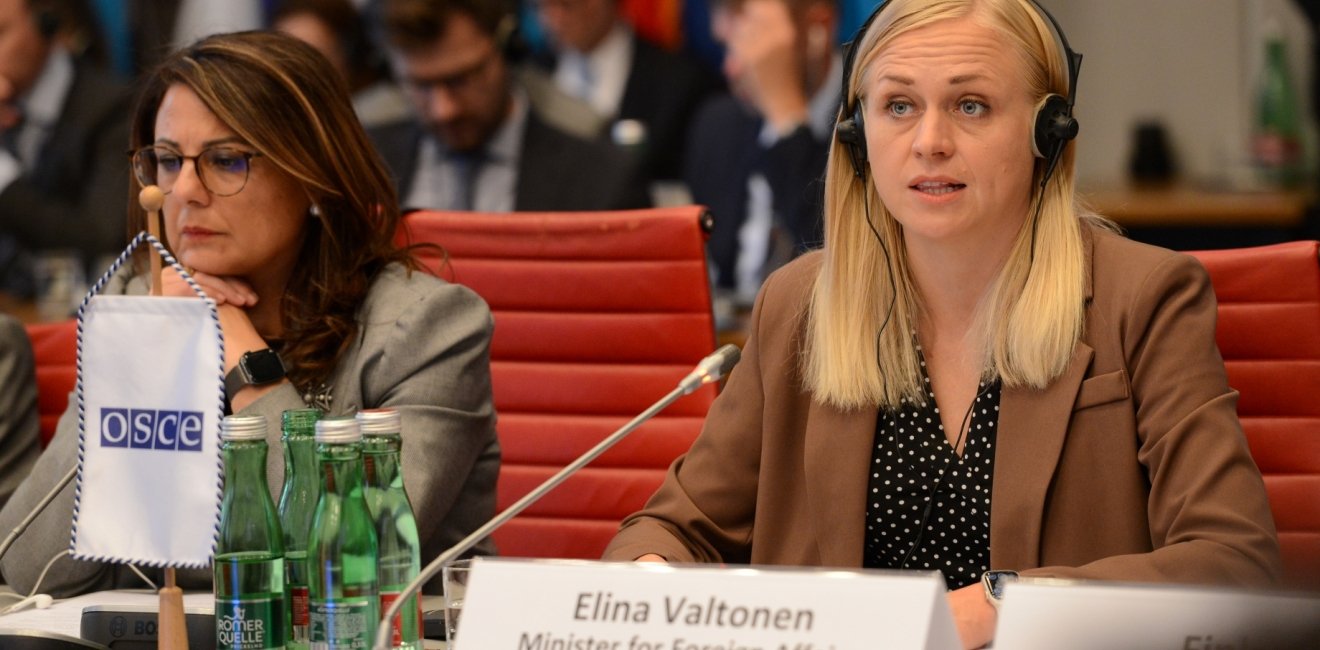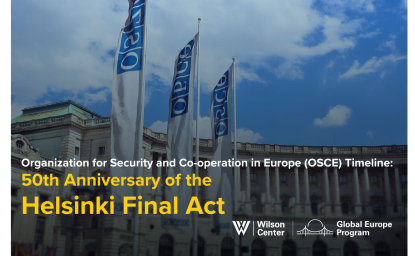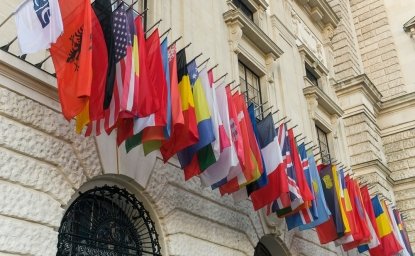On January 1, 2025, Finland assumed the Organization for Security and Co-Operation (OSCE) chairpersonship ahead of the 50th anniversary of the Helsinki Final Act (also known as the Helsinki Accords). Finland’s chairpersonship comes at a difficult time for the OSCE, the world’s largest security organization with 57 participating states.
In recent years, the organization has faced significant internal struggles, especially after Russia launched its illegal invasion of another participating state, Ukraine, in February 2022. Since then, Russia’s use of its veto power has prevented consensus, limiting the efficacy of the multilateral forum and leading some to question its continued role and value. In 2025, as multiple conflicts around the world fester or spread, the OSCE’s role to promote security in Europe is more critical than ever. This puts Finland in the spotlight to rekindle the original Helsinki spirit of compromise and cooperation that helped reduce tensions during the Cold War.
In the last few years, the OSCE has faced unprecedented challenges and gridlock.
For those tuning in to the OSCE for the first time in this landmark anniversary year, the venerable international institution is the continuation of the Cold War-era Conference on Security and Cooperation in Europe (CSCE). In 1975, as détente allowed cooler heads to prevail, 35 participating states came together in Helsinki and signed the Final Act, establishing 10 principles to define Europe’s security order. This was re-confirmed in 1990, as the Cold War waned and the Charter of Paris for a New Europe was agreed upon by the original 35 participating states. The spirit of Helsinki, or the willingness of adversaries to come together for dialogue and with a holistic view of comprehensive security that includes human rights, has faltered as a revanchist Russia wages illegal wars in its periphery.
In the last few years, the OSCE has faced unprecedented challenges and gridlock. Russia has used its veto to block the approval of a new budget, delay the appointment of the next chair-in-office (the country that establishes and drives the agenda of the organization for the calendar year), and created a brief leadership crisis last year that was finally resolved in December.
Despite the challenges the organization experiences in its secretariat, headquartered in Vienna, the OSCE continues to operate field missions in a dozen countries that maintain their effectiveness. The missions, which work in close cooperation with their host countries, toil away at both micro and macro security concerns, from the removal of dangerous chemicals in Transnistria to the training of border security guards to fight illegal logging. These missions continue to operate despite an unclear budget and future.
The most emblematic sign of the struggles the organization is facing is the recent change in Secretary Generals. Since June 1993, the OSCE Secretary General has steered the work of the organization in cooperation with the chair-in-office. The mandate for this role, usually held by senior diplomats, is typically three years, with the opportunity to extend for a second and final term of three years. The previous Secretary General, German diplomat Helga Schmid, had held the role since December 2020 and, at the Skopje Ministerial in December 2023, was unable to formally extend her term due to the ongoing lack of consensus driven by Russia and Belarus. The result was a temporary nine month extension that expired on September 3, 2024, forcing Secretary General Schmid to step down. However, this was not the first time the OSCE has lacked a Secretary General since the position’s creation in December 1992. In the summer of 2020 a stalemate in reaching consensus on extended leadership at the time and again in December 2020, when then-chair Albania succeeded in achieving consensus on new leadership, which included former Secretary General Schmid.
Increasingly, calls for negotiating a ceasefire or ending the war in Ukraine are gaining ground. In any post-conflict scenario, the OSCE is likely to play a role in maintaining or enforcing a peace deal or ceasefire.
The Secretary General is only one of four leadership roles that faced a nine month extension that ended in September 2024. This includes the Director of the Office For Democratic Institutions and Human Rights, the OSCE High Commissioner on National Minorities, and the OSCE Representative on Freedom of the Media. At the December 2024 Valletta Ministerial, a consensus was finally reached and Turkish diplomat Feridun Sinirlioğlu became the eighth Secretary General of the OSCE, along with filling the other three leadership roles. The three month gap in leadership was a testament to the institutional challenges facing the OSCE and the breakdown of the spirit of Helsinki.
Why is the OSCE needed in 2025 and beyond? Increasingly, calls for negotiating a ceasefire or ending the war in Ukraine are gaining ground. In any post-conflict scenario, the OSCE is likely to play a role in maintaining or enforcing a peace deal or ceasefire. The organization was instrumental in implementing the Dayton Peace Accords, which ended the conflict in the Western Balkans. Its role in monitoring a potential ceasefire and the border was also mentioned in the Minsk Agreements of 2014-2015. Despite the fact that the Minsk Agreements were ultimately unsuccessful, the OSCE’s position as a convening platform for both Russia and the United States means it will likely play a role in 2025. Despite its institutional challenges, the OSCE is still a necessary multilateral forum for US-Russia dialogue and a versatile toolbox for countries from North America to Central Asia.
But OSCE is more than a platform for discussion and a toolbox for conflict prevention. It is also a repository of agreed principles defined (by sometimes contentious participants) over its fifty years of existence. That is why the Finnish chairpersonship in 2025 comes at a critical time. It is an opportunity for the organization to return to its roots, even as the OSCE faces questions about its future. In a speech at the Permanent Council in Vienna on September 19th, Finnish Foreign Minister Elina Valtonen outlined the issues that will be in focus for the coming year.
First, Finland will emphasize the shared principles and commitments inherent to the OSCE: sovereignty, territorial integrity, non-intervention in internal affairs and respect for human rights, with promises to vocally call out when these principles are violated. Second, Finland aims to safeguard OSCE’s future, by simultaneously utilizing the tools and enhancing the work of the organization. This encompasses both long-term planning within the organization itself, securing future funding, and making full use of the OSCE’s 12 current field missions and three autonomous institutions to ease tensions while simultaneously supporting Ukraine.
All of this falls under a larger theme of strengthening the resilience of both the OSCE itself as well as its participating states, for which the OSCE’s long tradition of a comprehensive view of security is well-suited. With war ongoing on Europe’s doorstep, Finland hopes to rekindle the spirit of Helsinki in 2025 and reinvigorate the OSCE as a key and constructive player in conflict management.
This article was updated on January 24 to reflect clearer language on the term of the Secretary General.
Authors




Global Europe Program
The Global Europe Program is focused on Europe’s capabilities, and how it engages on critical global issues. We investigate European approaches to critical global issues. We examine Europe’s relations with Russia and Eurasia, China and the Indo-Pacific, the Middle East and Africa. Our initiatives include “Ukraine in Europe”—an examination of what it will take to make Ukraine’s European future a reality. But we also examine the role of NATO, the European Union and the OSCE, Europe’s energy security, transatlantic trade disputes, and challenges to democracy. The Global Europe Program’s staff, scholars-in-residence, and Global Fellows participate in seminars, policy study groups, and international conferences to provide analytical recommendations to policy makers and the media. Read more

Explore More
Browse Insights & Analysis
The OSCE is a Good Value for America





